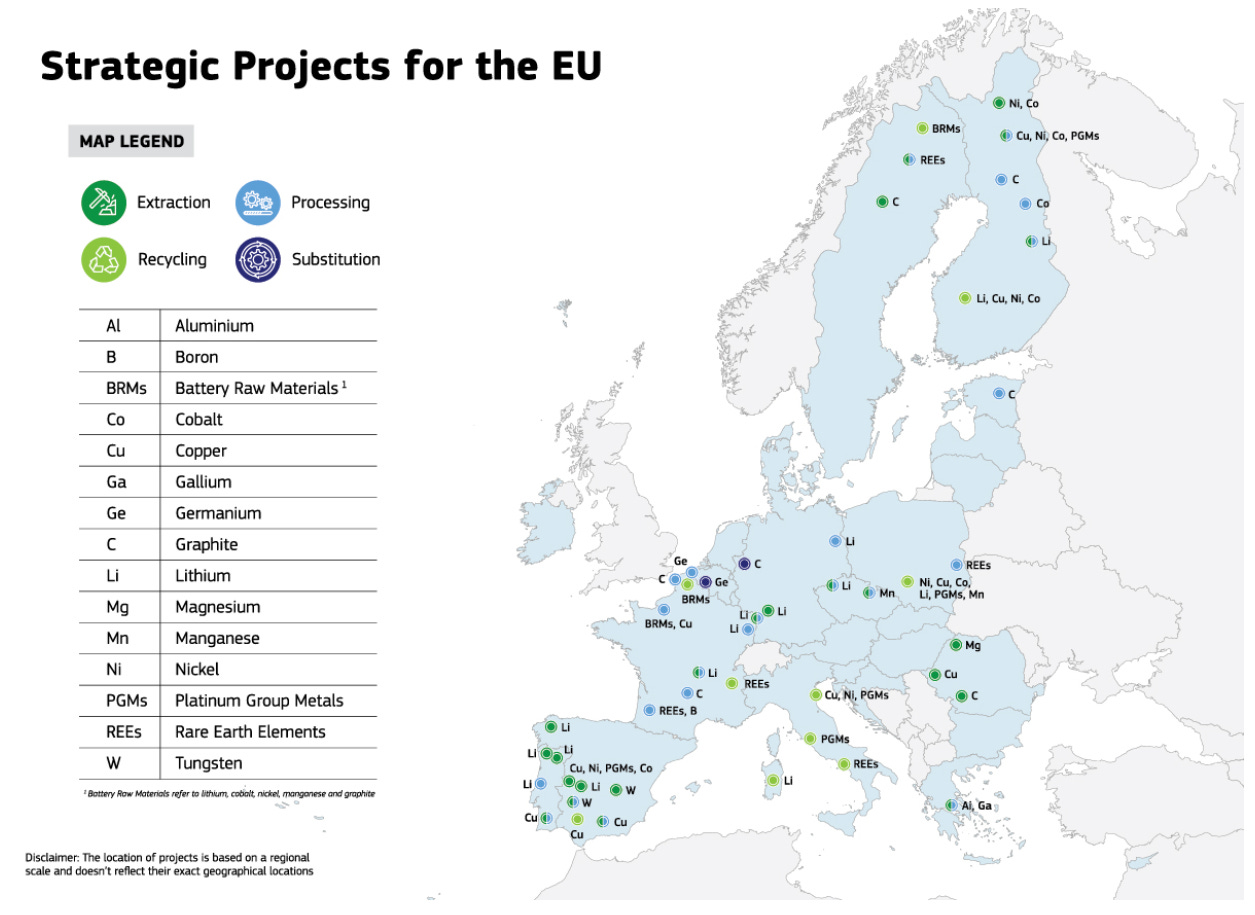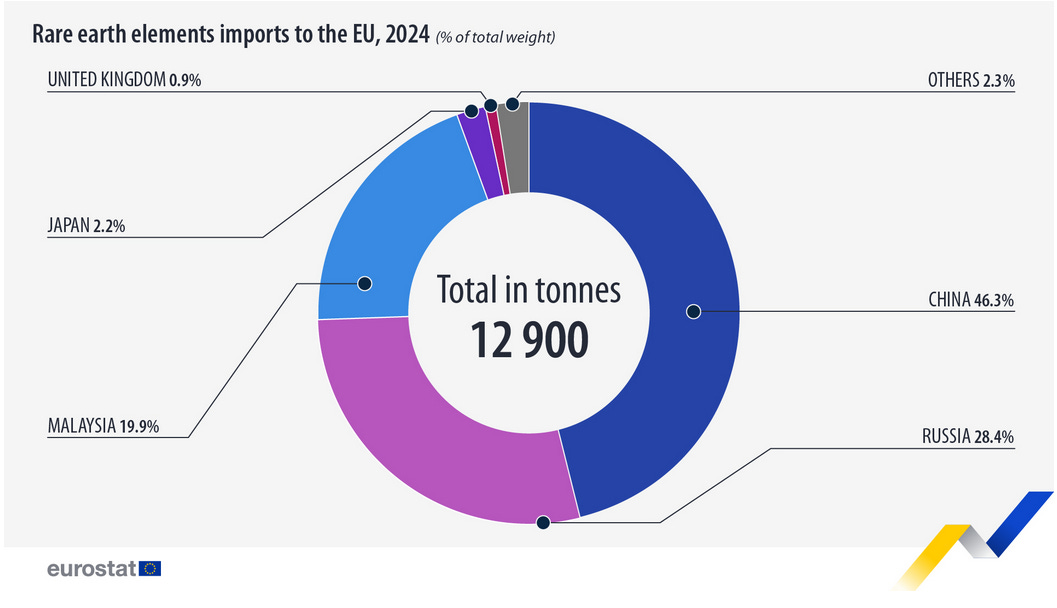The European Union (EU) wants to secure its critical minerals supply chain by reducing its import reliance. The bloc also wants to strengthen its production and recycling initiatives as it vies with the US and China in the rare earth market.
On March 25, the European Commission identified 47 strategic projects across 13 member states as part of the Critical Raw Minerals Act (CRMA). They include Savannah Resources' SAVNF, Barroso Lithium Project in Portugal and Anglo American's AAUKF Sakatti cobalt-nickel project in Finland.
“We cannot afford to be naive anymore," the Vice-President of the European Commission, Stéphane Séjourné, said. "Europe must take control of its raw material supply chains to remain competitive in the global race for energy transition."
A lengthy and complicated permitting process has limited the EU's efforts to boost the production of essential minerals. A study published by the European Federation of Geologists noted a need for all Member states to streamline the permitting process, as it takes 8 to 15 years, which is double or triple the time compared to top industry jurisdictions like Canada or Australia.

Lengthy EU Approval Time Slows Mining Projects
In the past, approval times for EU mining projects took decades. To address this issue, the European Commission has simplified the process by rolling out fast-track timelines.
Now, strategic mining projects can expect approval in just 27 months, while processing and recycling initiatives will see a quicker 15-month turnaround.
This will speed up the development of lithium, nickel, cobalt, and rare earth element projects. These minerals are vital for producing batteries, wind turbines, and a range of high-tech products.
Europe's heavy reliance on imports—especially from China for rare earths and Chile and Australia for lithium—has exposed it to potential supply chain disruptions. In 2024, the EU sourced 46% of its 12,900 tons of rare earth imports from China.

Production Delays Force Swedish Battery Maker into Bankruptcy
Last month, Swedish battery maker Northvolt filed for Chapter 11 bankruptcy after BMW BMWKY terminated a $2.2 billion contract the previous summer due to production delays. Once valued at $20 billion, Northvolt was the EU's largest green energy project.
It had heavily relied on imports of Chinese cathode material and machinery. This stretched supply chains and rendered the company unable to compete with Chinese costs or speed to market.
The inability to produce the cathode mixture of lithium-nickel-manganese-cobalt oxide domestically required over 7,000 tons of imports from China, whose production stood at 3.3 million tons in 2024 – 82% of the global supply.
EU Wants to Encourage Domestic Production of Rare Earths
The EU hopes to encourage domestic investment by reducing red tape and lessening its dependence on non-European suppliers. The EU has allocated billions of euros to expand its production of rare earths.
Caremag, a subsidiary of Carester, is building a rare earth recycling and refining plant in Lacq, France, with a €216 million investment.
Bain & Company sees Europe producing less than 5,000 tons of rare-earth oxides by 2030, while anticipated demand could grow by 50% to 30,000 tons.
"We do not expect sufficient permanent magnet making in Europe in the current environment," Laurent Migom, the firm's partner, said at an event in La Rochelle. China accounts for nearly all of the world's production of rare earth permanent magnets.
EU Commits to Environment Standards Despite Mining Push
However, streamlining project approvals doesn't mean compromising on environmental standards for Brussels.
The EU is implementing stricter guidelines to ensure fast-tracked projects meet sustainability requirements. Companies seeking permits must show that they practice responsible extraction, have solid land restoration plans, and engage with local communities.
The EU understands that recycling is necessary for long-term mineral independence. To address this problem, it has ramped up regulations that demand higher recovery rates from electronic waste, used batteries, and industrial byproducts.
The regulation set a hurdle: by 2031, 16% of cobalt, 85% of lead, 6% of lithium, and 6% of nickel must come from recovered battery manufacturing or post-consumer waste.
EU Accelerates Minerals Strategy Amid US Tariff Push
US President Donald Trump's tariff threat has pushed the EU to accelerate its minerals strategy. European manufacturers are concerned about higher costs and supply constraints if a trade war erupts.
Brussels has discussed new partnerships, signing a new deal with Australia a year ago, and strengthening the partnership with Canada to secure reliable supplies beyond just China and the US.
As Europe looks to boost its mining industry, it's trying to stay competitive in a global market often influenced by political instability. A change in US policy could also have repercussions for EU companies operating in North America.
Many European businesses depend on integrated supply chains that connect both continents, and new tariffs might force them to rethink how they produce goods. This is especially true for automakers, battery manufacturers, and renewable energy companies, as they rely heavily on a consistent supply of essential minerals for their products.
EU, like Trump, Could Look to Greenland for Minerals
Still, one European solution might cause further conflicts with Trump, whose territorial ambitions recently included Greenland. Denmark's overseas territory has lucrative mineral wealth and geostrategic positioning.
The latest preliminary economic assessment of the rare earth Tanbreez Project in southern Greenland estimated that just 1% of this project had a Net Present Value of $3 billion.
The project's operator, NYC-based Critical Metals Corp CRML, plans to spend $10 million on further exploration and eventually transform it into a project with an initial annual production of 80,000 tons of Rare Earth Oxides.
While Trump stands firm in his territorial ambitions, the newly elected Prime Minister of Greenland, Jens Frederik Nielsen, has opposed his stance in a Facebook statement on March 30.
“President Trump says that the United States will get Greenland.’ Let me be clear: The United States will not get it. We do not belong to anyone else. We decide our own future,” he said.
Disclaimer:
Any opinions expressed in this article are not to be considered investment advice and are solely those of the authors. European Capital Insights is not responsible for any financial decisions made based on the contents of this article. Readers may use this article for information and educational purposes only.
This article is from an unpaid external contributor. It does not represent Benzinga’s reporting and has not been edited for content or accuracy.
© 2025 Benzinga.com. Benzinga does not provide investment advice. All rights reserved.
Trade confidently with insights and alerts from analyst ratings, free reports and breaking news that affects the stocks you care about.